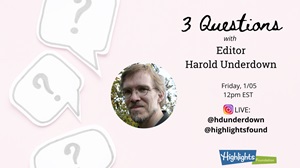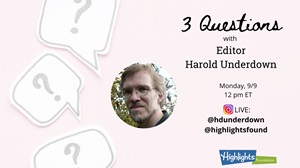Editor and Highlights Foundation faculty member Harold Underdown joined Cat Galeano on Instagram Live to talk about Harold’s mini-course Successful Strategies for Submitting Your Manuscript to Agents and Editors. Watch the conversation below. (Please note: closed captions are available in the video below. You can see them by hovering over the bottom of the video and choosing the “CC” icon.)
Some Tips from the Chat:
Research the Agent: “One of the things people should be looking at when they’re going out on submission is making sure that the agents who they are looking at are actually well-versed in essentially the market that they are working with.”
Work on the Craft: “There’s a considerable craft–as you know-there is a considerable craft to writing children’s books of all the different kinds. And what people really need to do, before they start sending out a manuscript, is learn the craft to the point where it’s going to be, where it’s actually going to be competitive in what is honestly a really, really crowded and competitive market.”
Be Ready for the Long Haul: “It’s the importance of understanding that the process is probably going to be lengthy and more complicated than you expected when you started.”
Stay Organized: “I think you’ll quickly find that if you don’t develop some kind of basic way of keeping track, you’re going to get lost.”
Full Transcript:
Cat: A big hello to our Highlights Foundation family! We’re so happy to have you with us today. For those that may not know me, I’m Cat Galeano and I’m the social media manager for the Highlights Foundation, joining you from Westchester NY, on the traditional lands of the Siwanoy people. I’m also a writer and a reader who is very very excited to have this lunchtime chat with our friend and faculty Harold Underdown, where we’ll talk a little bit about his upcoming mini-course Successful Strategies for Submitting Your Manuscript to Agents and Editors: A Two-Night Mini. Now we’re going to jump into some questions, Harold.
Harold: Sure.
Cat: You wrote a short blog a while back for the Highlights Foundation about what agents do. You said you get a lot of questions about that on social media, and when you teach. Why do you think people want to know more about the agent/creative relationship? Well, maybe about the whole publishing process in general?
Harold: I think part of the reason, very basic, is that people know that agents are important in the process and that there’s–almost in all cases, certainly more than used to be the case–if you don’t have an agent your options are more limited. And so people are wanting to know about agents and what they do. And interestingly, there isn’t always a lot of information about that just kind of generally available. You have to go to certain places, you know like there’s the Crash Course that I teach at Highlights that actually gets into that but um people you know, people do want to know what agents do.
It’s more than just being there as the kind of conduit that takes you to a publisher, you know. I think a lot of people do know that agents are often necessary for a lot of publishers, that the publishers will not look at your manuscript unless you have an agent.
And the fact is, it’s more than that. The agents who are sending out manuscripts, they actually have to know the people they’re sending them to, they have to understand the publishing programs of those editors because otherwise, it’s essentially a waste of time.
If someone sends a manuscript to an editor that’s either a kind of book they don’t publish–maybe they’re a YA editor and they’ve been sent a chapter book.Or it could be something more subtle than that. It’s just not the kind of story that they’re interested in maybe in a thematic sense or a genre sense. So that’s an area where agents hopefully know more about the different needs of different publishers and the different editors than an author might.
Cat: It’s almost like they have more of a pulse on that than an author would.
Harold: You would hope so! Actually one of the things people should be looking at when they’re going out on submission is making sure that the agents who they are looking at are actually well-versed in essentially the market that they are working with.
And, you know, agents do more than that, though. Again, it’s not just about making that connection for you. They also negotiate your contract and understand how contracts work. It’s not just about getting more money–which they may or may not be able to do–it’s also about all the different kinds of requirements that you’re agreeing to in the contract. It’s about what are called subsidiary rights, which are different things that can be done with your text beyond turn it into a hardcover or paperback book
And finally they’re hopefully going to be with you for years to come keeping track of when royalty statements and payments are supposed to be coming in. Essentially, keeping track of your finances. And at the same time working with you on your development as an author and where you’re going with your career. So there’s really a lot that agents do. And that’s just a very quick rundown.
Cat: Great! For those that may not know, that’s very good information. I’m not agented, so I’m definitely taking mental notes on everything you’ve just said. So I hope it’s useful for everyone else. We’re going to jump into our second question, which is:
In the description of your upcoming course, it says this line about the kidlit industry and the publishing process that I really think is important: “Part one of this journey is crafting the very best story.” That’s important to remember, isn’t it? That craft comes first? Can you share your thoughts on that?
Harold: Sure. I think that’s the important point because especially for people just coming in. (I know, just from some of the names I’ve seen of folks who’ve joined today, that this isn’t going to apply to them.) But for folks just getting started, they’ll write a manuscript and they’ll think it’s great and they’ll just want to get it out there because they think everybody else will agree. And they’ll often end up being very disappointed because it’s simply not ready.
Even if they had a great idea, they haven’t worked on learning the craft. There’s a considerable craft–as you know–there is a considerable craft to writing children’s books of all the difrerent kinds. And what people really need to do, before they start sending out a manuscript, is learn the craft to the point where it’s going to be, where it’s actually going to be competitive in what is honestly a really really crowded and competitive market. There are thousands of other people all trying to do what you are doing and you have to make sure that your manuscript not only kinds of ticks the various boxes in terms of expectations–basic expectations for, you know, what a manuscript for a picture book looks like–or a chapter book, or a young adult novel looks like–but that it has a kind of spark and it that it’s going to stand up and actually grab someone’s attention. Getting it to that level is difficult to do.
And one of the things that I’m always telling people is don’t rely on your own sense of that. You really want to make sure that you’re getting feedback from someone else. Could be a critique group, it could be a writing partner, but don’t jump out there with a manuscript that isn’t ready because you’ll just be wasting your time.
Cat: I want to second everything you said, on top of like you said, having a writing partner, is just reading as much as what’s possible of what’s out there. Like you said, sometimes you look at your own manuscript and go “this is great” and then you look at something published and you’re like “wait a minute…maybe not so much.” So I definitely encourage everyone to read as much as possible in whatever genre you’re sort of playing in and wanting to step into, so I love that you said all of that.
Yeah, and our third question is: What is something basic that people should be aware of when submitting their manuscripts these days?
Harold: That’s a great question. First I was thinking, oh, I’ll answer that with something important about like getting the editor’s name right on your manuscript submit, because that’s something that surprisingly large numbers of people will get wrong. They’ll have a template or, you know, a previous email that they sent out that said “Dear Anna” and then they’ll send it to me–and I’m not Anna.
Cat: Please, double-check your spelling and your names, people!
Harold: But that’s actually not going to be my answer because I think more fundamental than that is the importance of understanding that the process is probably going to be lengthy and more complicated than you expected when you started. Um, this is something that I’ve always tried to communicate over the many years that I’ve been talking about submissions and the ways in which the process has changed over the years.
It’s always, there’s always more involved than you think when you’re getting started. And I actually did some research–I reached out to authors I know and asked them to tell me so, what was your story? Can you give me a rundown of how you got a manuscript either directly to a publisher—or to an agent and then to a publisher–and how did that work out for you?
Because I wanted to check. You know, maybe things are different now and it’s not as complicated necessarily as it used to be. Well, it turns out they’re even more complicated. The great thing, that’s not necessarily bad, it’s just a case of you have to be ready to kind of continue with that process. And to go where the process takes you and realize that you’ll be pursuing your own path. And I think that’s really interesting. Personally I find people’s stories about how they made that connection and landed that contract–those are always interesting stories.
And so I’ll be sharing a few of those as part of my workshop because I think they’re really illuminating and potentially inspiring to see people who didn’t give up and who got a manuscript they really cared about to a place, to a publisher who would do the right things with it. And that’s really what it all comes down to.
Cat: I love that, and I also want to second, as a person who’s kind of gone in and out of the querying trenches and is currently revising like crazy before I step back into that. A, I can’t wait to join your workshop! I will definitely be watching behind-the-scenes. But too, I also think that, like you said, wanting it so badly is the most important thing because the rejections are so overwhelming , so just never giving up and continuing to keep pressing that button and keep sending those emails and those um those queries and too I feel like something I’ve learned during the querying process the last couple of years is to be organized, which I feel like people don’t talk about as much, so I definitely want to point out: be organized, because I certainly was not at the beginning and I had everything spread out everywhere and didn’t know what was happening.
Harold: That’s a great point. I’ll say, I’m not the most organized person myself, but I think you’ll quickly find that if you don’t develop some kind of basic way of keeping track, you’re going to get lost. And there are different ways to do it. I mean, people do everything from setting up the spreadsheet to just keeping notes. And whatever works for you is fine but you are going to have to do something like that.
Cat: Well, please! Don’t be like Harold and I: be better!
Well, thank you so much Harold, for your time. And if you’d like to learn more from Harold, please register for his 2-night mini Successful Strategies for Submitting Your Manuscript to Agents and Editors, taking place this January 16 and 18 at 7pm Eastern. And if you can’t come to the course live, please do still register. You will get the recordings emailed to you after the course and you’ll have about a month plus to re-watch all the materials.
Thank you so much Harold, for joining us today and we cannot wait to see you online soon.
Harold: Thanks, Cat. It was great chatting today. Thanks, everybody for joining.
Cat: Bye everyone! Thanks for joining us, and if you’re watching later too.







